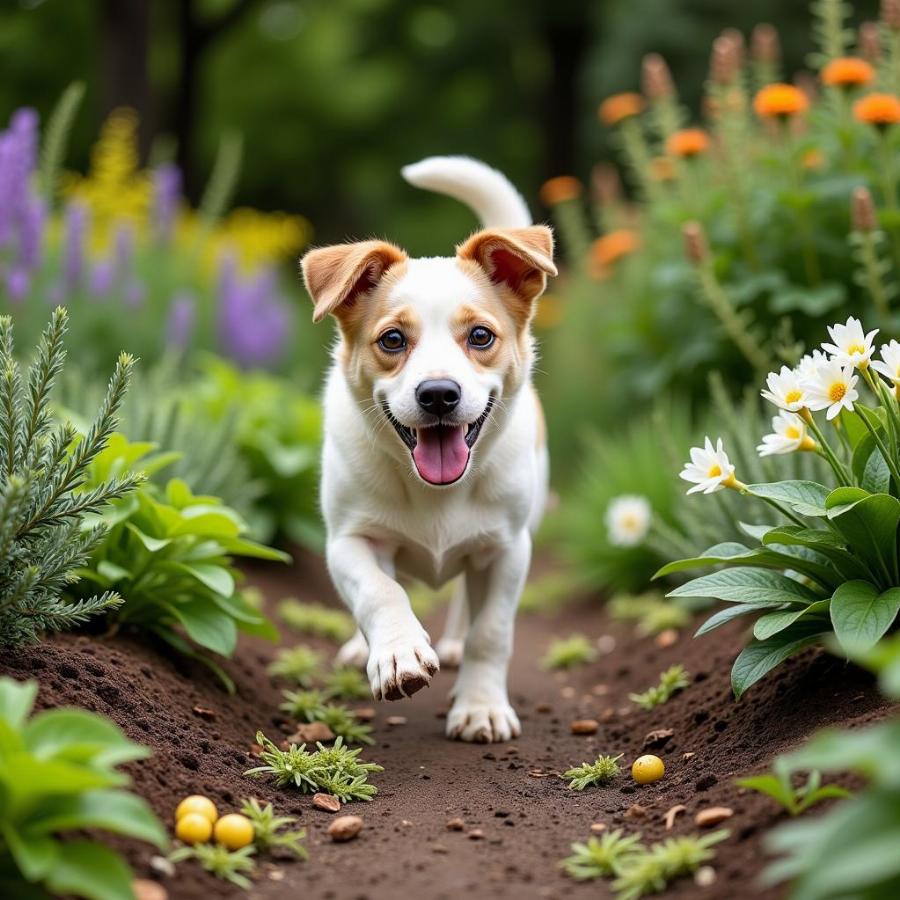Dog wood trees are a beautiful addition to any landscape, but are they safe for our furry friends? This is a common question among dog owners, and understanding the potential risks and benefits of having dogwood trees in your yard is crucial for responsible pet ownership. This article will delve into the relationship between dogs and dogwood trees, addressing safety concerns, care tips, and alternative options for dog-friendly landscaping.
Are Dogwood Trees Poisonous to Dogs?
While the name might suggest otherwise, dogwood trees (Cornus species) are generally considered non-toxic to dogs. The American Society for the Prevention of Cruelty to Animals (ASPCA) does not list dogwood trees as toxic to dogs. However, certain parts of the tree, specifically the berries and leaves, can cause mild gastrointestinal upset if ingested in large quantities. Symptoms might include vomiting, diarrhea, or loss of appetite. While not life-threatening, these symptoms can be uncomfortable for your pet.
Minimizing Risks and Ensuring Safety
Even though dogwood trees aren’t inherently poisonous, it’s always best to err on the side of caution. Here are some tips to minimize potential risks:
- Regularly rake up fallen berries and leaves: This prevents your dog from having easy access to them and reduces the temptation to nibble.
- Train your dog to avoid the tree: Basic obedience training can help teach your dog to “leave it” when it comes to the dogwood tree and its fruit.
- Supervise your dog in the yard: Especially when they are puppies or known to chew on plants, supervision can prevent unwanted ingestion.
- Consider alternative landscaping options: If you are concerned about your dog’s safety, there are many other beautiful and dog-friendly trees and shrubs available.
Dog-Friendly Landscaping Alternatives
If you decide that dogwood trees aren’t the right choice for your dog-friendly yard, here are some excellent alternatives:
- Crepe Myrtles: These trees offer vibrant blooms and are non-toxic to dogs.
- Redbud Trees: Known for their beautiful pink flowers, redbuds are another safe and attractive option.
- Ferns: These shade-loving plants add texture and greenery to your garden and are generally safe for dogs.
- Sunflowers: These bright and cheerful flowers are not only beautiful but also non-toxic to dogs.
 Dog Playing in a Dog-Friendly Garden
Dog Playing in a Dog-Friendly Garden
Caring for Your Dogwood Tree
Dogwood trees are relatively low-maintenance, but proper care ensures their health and longevity, indirectly contributing to the safety of your pet by minimizing the risk of weakened branches or fallen debris. Here’s a quick guide:
- Watering: Water deeply and regularly, especially during dry periods.
- Fertilizing: Use a balanced fertilizer in spring.
- Pruning: Prune in late winter or early spring to remove dead or diseased branches.
- Mulching: Apply a layer of mulch around the base of the tree to retain moisture and suppress weeds.
Dogwood Tree FAQ’s
- What are the symptoms of dogwood poisoning in dogs? While dogwoods are generally not poisonous, ingesting large quantities of berries or leaves can cause mild gastrointestinal upset such as vomiting and diarrhea.
- Are all varieties of dogwood trees safe for dogs? Yes, all species of Cornus (dogwood) are generally considered safe for dogs.
- What should I do if my dog eats dogwood berries? Monitor your dog for any signs of discomfort. If symptoms persist or worsen, contact your veterinarian.
What if my Dog Ingests Dogwood Berries?
While dogwood berries are not considered highly toxic, ingesting a large quantity can lead to mild gastrointestinal upset in some dogs. If your dog eats dogwood berries, monitor them closely for symptoms such as vomiting, diarrhea, or loss of appetite. If symptoms are severe or persistent, contact your veterinarian immediately.
Conclusion
Dogwood trees, while generally safe for dogs, can pose a minor risk if parts of the tree are ingested in large quantities. By taking precautions such as regular cleanup, training, and supervision, you can minimize these risks and enjoy the beauty of dogwood trees in your yard while ensuring the safety of your furry friend. Always prioritize your dog’s health and consult with your veterinarian if you have any concerns.
Beaut Dogs is your go-to resource for all things dog-related. We provide reliable and expert information on dog breeds, care, and everything in between. For further assistance and detailed information, contact us at Email: [email protected]. Beaut Dogs is committed to helping you provide the best possible care for your beloved canine companion.